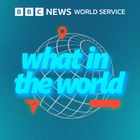
What in the World
Nov 4, 2024
COP 16 — the United Nations Biodiversity Conference of the Parties to the UN Convention on Biological Diversity — recently concluded in Colombia. One of the major issues was "biopiracy". That’s when companies take out patents to own the rights to living organisms, like plants — despite the fact many local and indigenous communities may have been using these plants and other biological material for centuries. BBC science and climate reporter Georgina Rannard explains the idea of biopiracy and why it’s so high stakes for both businesses and the communities that nurture traditional knowledge. And Nataly Canales, an evolutionary biologist, discusses how the issue of bio-piracy relates to the autonomy of her community — the Amazonian Quechua of Peru.
Instagram: @bbcwhatintheworld WhatsApp: +44 0330 12 33 22 6 Email: [email protected] Presenter: William Lee Adams Producers: Benita Barden Editor: Verity Wilde

